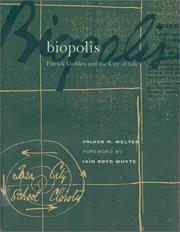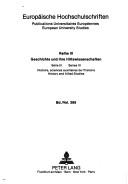| Listing 1 - 5 of 5 |
Sort by
|

ISBN: 0262232111 0262285983 1423725271 9780262285988 9781423725275 Year: 2003 Publisher: Cambridge, Mass. London MIT
Abstract | Keywords | Export | Availability | Bookmark
 Loading...
Loading...Choose an application
- Reference Manager
- EndNote
- RefWorks (Direct export to RefWorks)
"The Scottish urbanist and biologist Patrick Geddes (1854-1932) is perhaps best known for introducing the concept of the "region" to architecture and planning. At the turn of the twentieth century, he was one of the strongest advocates of town planning and an active participant in debates about the future of the city. He was arguably the first planner to recognize the importance of historic city centers, and his renewal work in Edinburgh's Old Town is visible and impressive to this day." "Geddes's famous analytical triad - place, work, and folk, corresponding to the geographical, historical, and spiritual aspects of the city - provides the basic structure of this examination of his urban theory. Volker Welter examines Geddes's ideas in the light of nineteenth-century biology - in which Geddes received his academic training - showing Geddes's use of biological concepts to be far more sophisticated than popular images of the city as an organic entity. His urbanism was informed by his lifelong interest in the theory of evolution and in ecology, cutting-edge areas in the late nineteenth century. Balancing Geddes's biological thought is his interest in the historical Greek concept of the polis, usually translated as city-state but implying a view of the city as a cultural and spiritual phenomenon." "Although Geddes's work was far-ranging, the city provided the unifying focus of nearly all of his theoretical and practical work. Throughout the book, Welter relates Geddes's theory of the city to contemporary European debates about architecture and urbanism."--Jacket.
City planners --- City planning --- Urbanistes --- Urbanisme --- Biography. --- History. --- Philosophy. --- Biographie --- Histoire --- Philosophie --- Geddes, Patrick, --- -City planning --- -Patrick Geddes 1854-1931 (° Perth, Schotland) --- Architectuur ; stedenbouw ; 1870-1932 ; Patrick Geddes --- Stadsplanning ; Groot-Brittannië ; theorie --- Ruimtelijke ordening ; architectuur ; regionale ontwikkeling --- De stad als biologisch concept --- 72.07 --- 72(410) --- Cities and towns --- Civic planning --- Land use, Urban --- Model cities --- Redevelopment, Urban --- Slum clearance --- Town planning --- Urban design --- Urban development --- Urban planning --- Land use --- Planning --- Art, Municipal --- Civic improvement --- Regional planning --- Urban policy --- Urban renewal --- Town planners --- Urbanists --- Architects --- Planners --- History --- Philosophy --- Architecten. Stedenbouwkundigen A - Z --- Architectuur ; Groot-Brittannië --- Government policy --- Management --- Geddes, Patrick Sir --- Patrick Geddes 1854-1931 (° Perth, Schotland) --- Geddes, P. --- Sociology & Social History --- Social Sciences --- Communities - Urban Groups

ISBN: 3631416814 Year: 1989 Publisher: Bern Lang
Abstract | Keywords | Export | Availability | Bookmark
 Loading...
Loading...Choose an application
- Reference Manager
- EndNote
- RefWorks (Direct export to RefWorks)
Book
ISBN: 9780857452344 Year: 2011 Publisher: New York Oxford
Abstract | Keywords | Export | Availability | Bookmark
 Loading...
Loading...Choose an application
- Reference Manager
- EndNote
- RefWorks (Direct export to RefWorks)
Book
ISBN: 9781606066140 Year: 2019 Publisher: Los Angeles : Getty Research Institute,
Abstract | Keywords | Export | Availability | Bookmark
 Loading...
Loading...Choose an application
- Reference Manager
- EndNote
- RefWorks (Direct export to RefWorks)
"This volume examines the patronage of modern architecture that the Tremaine family sustained for nearly four decades in the mid-twentieth century"--Provided by publisher.
Architecture, Domestic --- Habitations individuelles --- History --- Tremaine family --- Tremaine family --- Homes and haunts --- Art patronage.
Book
ISBN: 0857452347 Year: 2012 Publisher: New York : Berghahn Books,
Abstract | Keywords | Export | Availability | Bookmark
 Loading...
Loading...Choose an application
- Reference Manager
- EndNote
- RefWorks (Direct export to RefWorks)
Ernst L. Freud (1892-1970) was a son of Sigmund Freud and the father of painter Lucian Freud and the late Sir Clement Freud, politician and broadcaster. After his studies in Munich and Vienna, where he and his friend Richard Neutra attended Adolf Loos's private Bauschule, Freud practiced in Berlin and, after 1933, in London. Even though his work focused on domestic architecture and interiors, Freud was possibly the first architect to design psychoanalytical consulting rooms-including the customary couches-a subject dealt with here for the first time. By interweaving an account of Freud's pr
Architecture, Domestic --- History --- Freud, Ernst L., --- Criticism and interpretation.
| Listing 1 - 5 of 5 |
Sort by
|

 Search
Search Feedback
Feedback About UniCat
About UniCat  Help
Help News
News